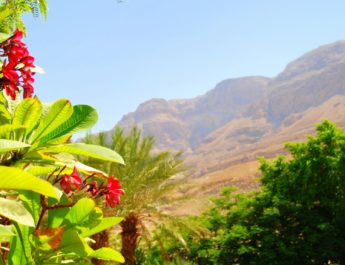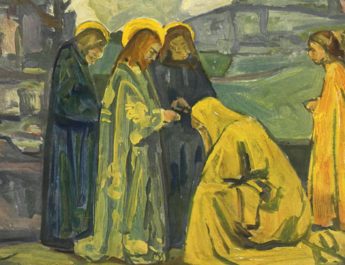BibleHub
1 AIf you will only obeyB theC LordD your God,E
Notes on verse 1a
A {untranslated} = hayah. This is to be or become, to happen.
B “obey” = shama + shama. This is to hear, call, consent, or consider. It implies listening intelligently, giving attention, and, because of these two factors, obedience and action are often implied. The word is repeated twice – the first time as an Infinitive Absolute. The Infinitive Absolute serves to emphasize the sentiment of the word. It is rather like Foghorn Leghorn’s speech pattern, “I said, I said.”
C {untranslated} = qol. This is a sound, used often for human voices. Also used when God speaks or angels, animals or instruments. It can be a cry or a noise, thunder or earthquakes and so on.
D “Lord” = YHVH. Related to {untranslated} in v1. From havah (to be, become) or hayah (see note A above). This is the name of the God of Israel, the self-existent and eternal one, the tetragrammaton. This pronunciation has been lost to time so “Lord” is generally used in its place.
E “God” = Elohim.
by diligently observingF allG his commandmentsH that I am commandingI you today,J
Notes on verse 1b
F “diligently observing” = shamar + asah. Shamar is to keep, watch, or preserve. It means to guard something or to protect it as a thorny hedge protects something. Asah is to make, do, act, appoint, become in many senses.
G “all” = kol. From kalal (to complete). This is all or every.
H “commandments” = mitsvah. From tsavah (to charge, command, order, enjoin). This is a commandment, law, ordinance obligation, or tradition. It is something commanded whether by God or by a human authority. This term is sometimes used collectively to refer to the Law.
I “commanding” = tsavah. Related to “commandments” in v1. See note H above.
J “today” = yom. Root may mean being hot. This is the day in a literal or figurative sense. It can also mean birth, age, daylight, continually or other references to time.
the Lord your God will setK you highL above all the nationsM of the earth;N
Notes on verse 1c
K “set” = natan. This is to give, put, set, offer. It is to give literally or figuratively.
L “high” = elyon. From alah (to go up, ascend, be high, be a priority; to arise in a literal or figurative sense). This is most high, upper. It refers to elevation – so, lofty.
M “nations” = goy. From the same root as gevah (the back, person, or body); related to gev (among); related to gaah (to rise up). This is nation or people. Often used to refer to Gentiles or foreign nations. It can also be used figuratively for a group of animals. This is where the Yiddish “goy” comes from.
N “earth” = erets. Root may mean to be firm. This is earth, ground, field land, or country.
2 all these blessingsO shall comeP upon you and overtakeQ you, if you obey theR Lord your God:
3 Blessed shall you beS in the city,T and blessed shall you be in the field.U
Notes on verses 2-3
O “blessings” = barakah. From barak (to kneel, bless; blessing God as part of worship and adoration; blessing humans to help them; can be used as a euphemism to say curse God). This is blessing, which implies prosperity or peace.
P “come” = bo. This is to enter, come in, advance, fulfill, bring offerings, enter to worship, attack. It can also have a sexual connotation.
Q “overtake” = nasag. This is to reach in a literal or figurative sense. It is to overtake, catch, or be able to.
R {untranslated} = qol. Same as {untranslated} in v1. See note C above.
S “blessed…be” = barak. Related to “blessings” in v2. See note O above.
T “city” = iyr. From uwr (to awaken or wake oneself up). This can mean excitement in the sense of wakefulness or city. Properly, this is a place that is guarded. Guards kept schedules according to watches. This sense of the word would include cities as well as encampments or posts that were guarded.
U “field” = sadeh. This is literally field, ground, soil, or land. It can be used to mean wild like a wild animal.
4 Blessed shall be the fruitV of your womb,W the fruit of your ground,X and the fruit of your livestock,Y both the increaseZ of your cattleAA and the issueBB of your flock.CC
Notes on verse 4
V “fruit” = peri. From parah (to bear fruit, grow, be fruitful, increase; bearing fruit in a literal or figurative sense). This is fruit or reward.
W “womb” = beten. Root may mean to be hollow. This is the belly or womb. It can also refer to a body more broadly.
X “ground” = adamah. From the same as adam (man, humankind); perhaps from ‘adom (to be red). This is ground, earth, soil as red, or land.
Y “livestock” = behemah. This is animal or cattle. It is often used of large quadrupeds.
Z “increase” = sheger. 5x in OT. This may come from to eject. This is firstborn, increase, offspring.
AA “cattle” = eleph. 8x in OT. From alaph (to learn, speak, associate with). This is cattle, clan, family.
BB “issue” = ashtaroth. 5x in OT. From ashath (to think) OR from ashar (to gain wealth, become rich, enrich; to accumulate). This is young, flock, issue.
CC “flock” = tson. This is a flock of sheep and goats.
5 Blessed shall be your basketDD and your kneading bowl.EE
6 Blessed shall you be when you come in, and blessed shall you be when you go out.FF
Notes on verses 5-6
DD “basket” = tene. 4x in OT. Root may mean weave. This is a basket.
EE “kneading bowl” = mishereth. 4x in OT. Perhaps from shaar (properly, swelling up i.e. being left over; a remnant, remaining, being redundant). This is a trough used to knead or a location where dough is put to rise.
FF “go out” = yatsa. This is to go or come out, bring forth, appear. It is to go out in a literal or figurative sense.
7 The Lord will causeGG your enemiesHH who riseII against you to be defeatedJJ beforeKK you;
Notes on verse 7a
GG “cause” = natan. Same as “set” in v1. See note K above.
HH “enemies” = oyeb. From ayab (to hate or be hostile to). This is a foe or enemy as one that you are hostile to.
II “rise” = qum. To arise, stand, accomplish, establish, abide. This is rising as in rising against, getting up after being sick or asleep, arising from one state to another, becoming powerful, or rising for action. It can also be standing in a figurative sense.
JJ “be defeated” = nagaph. This is to strike, beat, hurt, stumble, defeat, inflict disease.
KK “before” = paneh. From panah (to turn, face, appear). This is face in a literal or figurative sense. It could be face, presence, anger, respect. It can also be used of God to indicate divine favor or presence.
they shall come outLL against you oneMM way,NN and fleeOO beforePP you sevenQQ ways.
Notes on verse 7b
LL “come out” = yatsa. Same as “go out” In v6. See note FF above.
MM “one” = echad. Perhaps from achad (to unify, continue on a path; figuratively, to gather one’s thoughts). This is the number one, first, united. It can also be alone, altogether, a certain, a few.
NN “way” = derek. From darak (to tread, march, to walk. Can also mean affixing a string to a box since one needs to step on it to bend it in the process; so also an archer). This is a road as a thing that is walked on. Can be used figuratively for the path that one’s life takes or how one chooses to live one’s life.
OO “flee” = nus. This is to flee, vanish away, hide, escape, be displayed.
PP “before” = paneh. Same as “before” in v7. See note KK above.
QQ “seven” = sheba. This is seven or by sevenfold. It can also be used to imply a week or an indefinite number. Symbolically, this is the number of fullness, sacredness, perfection.
8 The Lord will command the blessing upon you in your barns,RR and in all that you undertake;SS he will bless youTT in the landUU that the Lord your God is givingVV you.
Notes on verse 8
RR “barns” = asam. 2x in OT. May come from a word that means to heap together. This is storehouse or barn.
SS “undertake” = mishloach. 10x in OT. From shalach (to send, send for, forsake, give a slave freedom). This is a sending out, an undertaking, a putting forth.
TT “you” = yad. This is hand, ability, power. Hand in a literal sense, but also what one can do or the means by which one does it.
UU “land” = erets. Same as “earth” in v1. See note N above.
VV “giving” = natan. Same as “set” in v1. See note K above.
9 The Lord will establishWW you as his holyXX people,YY as he has swornZZ to you, if you keepAAA the commandments of the Lord your God and walkBBB in his ways.
Notes on verse 9
WW “establish” = qum. Same as “rise” in v7. See note II above.
XX “holy” = qadosh. From qodesh (set apart and so sacred; God is different from us and so God is holy/set apart; things we dedicate to God’s service are set apart for God and so they, too, are holy); related to qadash (set apart, consecrated, hallowed, sanctified; something or someone set apart for a holy purpose or use – ceremonially or morally clean). This is sacred or holy in a ritual or moral sense. As a noun, it refers to a holy one (like a saint or angel), a holy place (the sanctuary), or God (the Holy One).
YY “people” = am. From amam (to darken, hide, associate; creating shadows by huddling together). This is people or nation. It can be used specifically for a tribe, collectively of troops or armies, or figuratively to refer to a flock of animals.
ZZ “sworn” = shaba. Related to “seven” in v7. From sheba (see note QQ above). This is to swear, curse, vow, make a covenant. Properly, it can mean to be complete. This is to seven oneself – as in affirming something so strongly it is as though it were said seven times.
AAA “keep” = shamar. Same as “diligently observing” in v1. See note F above.
BBB “walk” = halak. This is go, come, walk. It is walk literally and figuratively and includes people and animals. It can be used figuratively for one’s moral life – how we walk according to God’s way or against it. It can also refer to the walk of life as in the course one’s life takes, the choices we make, etc.
10 All the peoples of the earth shall seeCCC that you are calledDDD by the nameEEE of the Lord, and they shall be afraidFFF of you.
Notes on verse 10
CCC “see” = raah. This is to see in a literal or figurative sense so stare, advise, think, view.
DDD “called” = qara. This is to call or call out – to call someone by name. Also used more broadly for calling forth.
EEE “name” = shem. May be from sum (to put, place, set). This is name, fame, renown. A name was thought to indicate something essential about a person – something about their individuality. So, this word can also mean honor, authority, or character.
FFF “afraid” = yare. This is to fear, be afraid, dreadful. It can also refer to fearful reverence – to fear in a moral sense is to say to revere, respect.
11 The Lord will make you aboundGGG in prosperity,HHH in the fruit of your womb, in the fruit of your livestock, and in the fruit of your ground in the landIII that the Lord swore to your ancestorsJJJ to give you.
Notes on verse 11
GGG “make…abound” = yathar. This is to jut over, remain behind, preserve, to excel. It can be to leave or to be in abundance.
HHH “prosperity” = tob. From tob (to be pleasing, to be good). This is good, beautiful, pleasant, agreeable, bountiful, at ease. This word is used for goodness as a concept, a good thing, a good person. This can refer to prosperity and welfare as well as joy, kindness, sweetness, and graciousness. So, this is ethically good, but also enjoyably good.
III “land” = adamah. Same as “ground” in v1. See note X above.
JJJ “ancestors” = ab. This is father, chief, or ancestor. It is father in a literal or figurative sense.
12 The Lord will openKKK for you his richLLL storehouse,MMM the heavens,NNN to give the rain of your landOOO in its seasonPPP
Notes on verse 12a
KKK “open” = pathach. This is to open wide in a literal or figurative sense. So, it is open, draw out, let something go free, break forth. It can also mean to plow, engrave, or carve.
LLL “rich” = tob. Same as “prosperity” in v11. See note HHH above.
MMM “storehouse” = otsar. From atsar (to store up, hoard). This is treasure or the place where one keeps treasure – a depository, storehouse, armory, cellar.
NNN “heavens” = shamayim. Root may mean being lofty. This is sky, the air, or heaven. It is in a dual noun form so this might refer to the part of the sky where the clouds move on the one hand and the part beyond that where the sun, moon, and stars are on the other hand.
OOO “land” = erets. Same as “earth” in v1. See note N above.
PPP “season” = et. Probably from anah (to answer, sing, announce); from ad (forever, all, old); from adah (to pass on, advance, decorate oneself). This is a period or season. It can also mean whenever or continually.
and to bless all your undertakings.QQQ You will lendRRR to manySSS nations, but you will not borrow.TTT
Notes on verse 12b
QQQ “undertakings” = ma’aseh + yad. Literally, “work of your hand.” Ma’aseh is related to “diligently observe” in v11. From asah (see note F above). This is a word – any action whether positive or negative. It can also be a transaction, construction, activity, property, or something that is produced. Yad is the same as “you” in v8. See note TT above.
RRR “lend” = lavah. This is to join, abide with, borrow. Properly, it means to twine, which gives it the sense of joining or uniting. It can also mean to remain or borrow/lend as joining an obligation to another. This root may be where the name/tribe Levi comes from.
SSS “many” = rab. From rabab (increasing in any aspect whether quantity, authority, size, quality, greatness, etc.). This is abundance, many, elder, exceedingly, great. It refers to abundance of amount, rank, or status.
TTT “borrow” = lavah. Same as “lend” in v12. See note RRR above.
13 The Lord will makeUUU you the head,VVV and not the tail;WWW you shall beXXX onlyYYY at the top,ZZZ and notAAAA at the bottomBBBB—if you obey the commandments of the Lord your God, which I am commanding you today, by diligently observing them,
Notes on verse 13
UUU “make” = natan. Same as “set” in v1. See note K above.
VVV “head” = rosh. This may come a word that means to shake. It is the head, captain, or chief. It can also be excellent or the forefront. It can be first in position or in statue or in time (i.e. the beginning).
WWW “tail” = zanab. 11x in OT. Perhaps from zanb (to curtail, cut a tail off, attack from behind; perhaps from a word meaning to wag). This is a tail or stub – in a literal or figurative sense.
XXX “be” = hayah. Same as {untranslated} in v1. See note A above.
YYY “only” = raq. From the same as raq (thin, surely, only); perhaps from raqaq (to spit). This is but, except, at least. In the sense of being thin, it figuratively refers to some kind of limit.
ZZZ “top” = maal. Related to “high” in v1. From alah (see note L above). This is the upper part, forward, high above, upwards, greater, heaven, or exceedingly.
AAAA {untranslated} = hayah. Same as {untranslated} in v1. See note A above.
BBBB “bottom” = mattah. 19x in OT. From natah (to stretch or spread out, extend, bend). This is downwards, bottom, under, lower.
14 and if you do not turn asideCCCC from anyDDDD of the wordsEEEE that I am commanding you today, either to the rightFFFF or to the left,GGGG
Notes on verse 14a
CCCC “turn aside” = sur. This is to turn aside in a literal or figurative sense – to depart, decline, rebel, remove, or withdraw.
DDDD “any” = kol. Same as “all” in v1. See note G above.
EEEE “words” = dabar. From dabar (to speak, declare, discuss). This is speech, a word, a matter, an affair, charge, command, message, promise, purpose, report, request. It is a word, which implies things that are spoken of in a wide sense.
FFFF “right” = yamin. May be from yamam (to go or choose the right, use the right hand; to be physically fit or firm). This can mean right hand, right side, or south. Since most people are right-handed, the metaphorical usage of this word presumes that the right hand is stronger and more agile. Thus, it is the instrument of power and action.
GGGG “left” = semol. Perhaps from the same as simlah (mantle, clothes, wrapper); perhaps from semel (image, figure, likeness). This is left, left side, or north as the part that is dark.
followingHHHH otherIIII godsJJJJ to serveKKKK them.
Notes on verse 14b
HHHH “following” = halak + achar. Halak is the same as “walk” in v9. See note BBB above. Achar is from achar (to remain behind, linger, continue, be behind, or delay; can also imply procrastination). This is after or the last part, following.
IIII “other” = acher. Related to “following” in v14. From achar (see note HHHH above). This is following, next, strange, other.
JJJJ “gods” = elohim. Same as “God” in v1. See note E above.
KKKK “serve” = abad. This is to work, serve, or compel. It can describe any kind of work or service (including religious devotion). Also, till or cultivate. Used causatively, it can mean to enslave or keep in bondage.
Image credit: “Moses Views the Promised Land” by Frederic Leighton, 1881.




